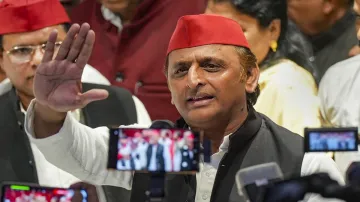Amid the ongoing Lok Sabha elections, Samajwadi Party (SP) Chief Akhilesh Yadav has said that their agitation against the Electronic Voting Machine (EVM) will continue adding first they will win this election by using EVMs and then will remove them if they come to power.
"This is a long fight. Our agitation against the EVM will continue. Germany is an example of an economically and socially stronger country than India, where the use of EVMs is considered unconstitutional... We have decided that we will defeat them using EVMs and then we'll remove EVMs," said Akhilesh Yadav.
Speaking on Rahul Gandhi contesting from two Lok Sabha seats including Rae Bareli and Wayanad, Akhilesh Yadav said, "There are many examples of leaders contesting from two Lok Sabha constituencies. We have also contested from two Lok Sabha constituencies, Netaji has also contested from two Lok Sabha constituencies, Prime Minister has also contested from two Lok Sabha constituencies. Rahul Gandhi will win in Wayanad and Raebareli with record votes."
Not the first time when Opposition leaders have raised questions on the credibility and use of EVMs in elections. Time and again, they have raised objections on the use of EVMs whenever they faced defeat. Recently in a crucial judgement amid the polls, the top court dismissed a plea seeking 100 per cent verification of VVPAT slips.
On Monday, the Supreme Court dismissed a plea raising the issue of tallying of Voter Verifiable Paper Audit Trail (VVPAT) slips with the votes cast using the Electronic Voting Machines (EVMs).
A bench of justices BR Gavai and Sandeep Mehta told the petitioner's counsel that a coordinate bench of the apex court had last week delivered its verdict on the issue.
"A coordinate bench has already taken a view," the bench said, while refusing to entertain the plea.
When the petitioner's counsel said the issue was of transparency and the apex court had already suggested some safeguards, the bench observed, "Another bench has already passed an order two days back."
On April 26, an apex court bench of justices Sanjiv Khanna and Dipankar Datta had rejected the pleas seeking complete cross-verification of votes cast using EVMs with VVPAT, an independent vote verification system which enables electors to see whether their votes have been recorded correctly.
Terming the suspicion of manipulation of the EVMs "unfounded", the bench had rejected the demand for reverting to the old paper ballot system, saying the polling devices were "secure" and eliminate booth capturing and bogus voting.
However, the top court had opened a window for the aggrieved unsuccessful candidates securing the second and third places in the poll results and allowed them to seek verification of micro-controller chips embedded in five per cent EVMs per assembly constituency on a written request upon payment of a fee to the poll panel.
It had directed that from May 1, the symbol loading units should be sealed and secured in a container and stored in a strongroom along with the EVMs for a minimum period of 45 days post-declaration of results.
ALSO READ | I.N.D.I.A bloc govt's first decision will be to waive off farmers' loans, promises SP President Akhilesh Yadav
